An Analysis of CSR Drivers and Effectiveness in the Niger Delta Region
VerifiedAdded on 2022/09/17
|53
|13774
|22
Project
AI Summary
This project investigates the effectiveness of Corporate Social Responsibility (CSR) initiatives and their primary drivers within Nigeria's Niger Delta region. The research explores the concept of CSR, examining how it is implemented by oil companies operating in the area and the factors that influence these activities. The study identifies the drivers of CSR in the Niger Delta, analyzes the relationship between these drivers and the effectiveness of CSR programs, and evaluates the overall impact of these initiatives. The research employs a comprehensive methodology, including literature review, data analysis, and findings interpretation to assess the impact of CSR on the region's social, environmental, and economic aspects. The study aims to provide recommendations for oil companies to enhance their CSR activities and contribute positively to the communities in the Niger Delta. The project also addresses the historical context of CSR in Nigeria and the challenges faced by the local population, highlighting the importance of corporate accountability in addressing these issues.
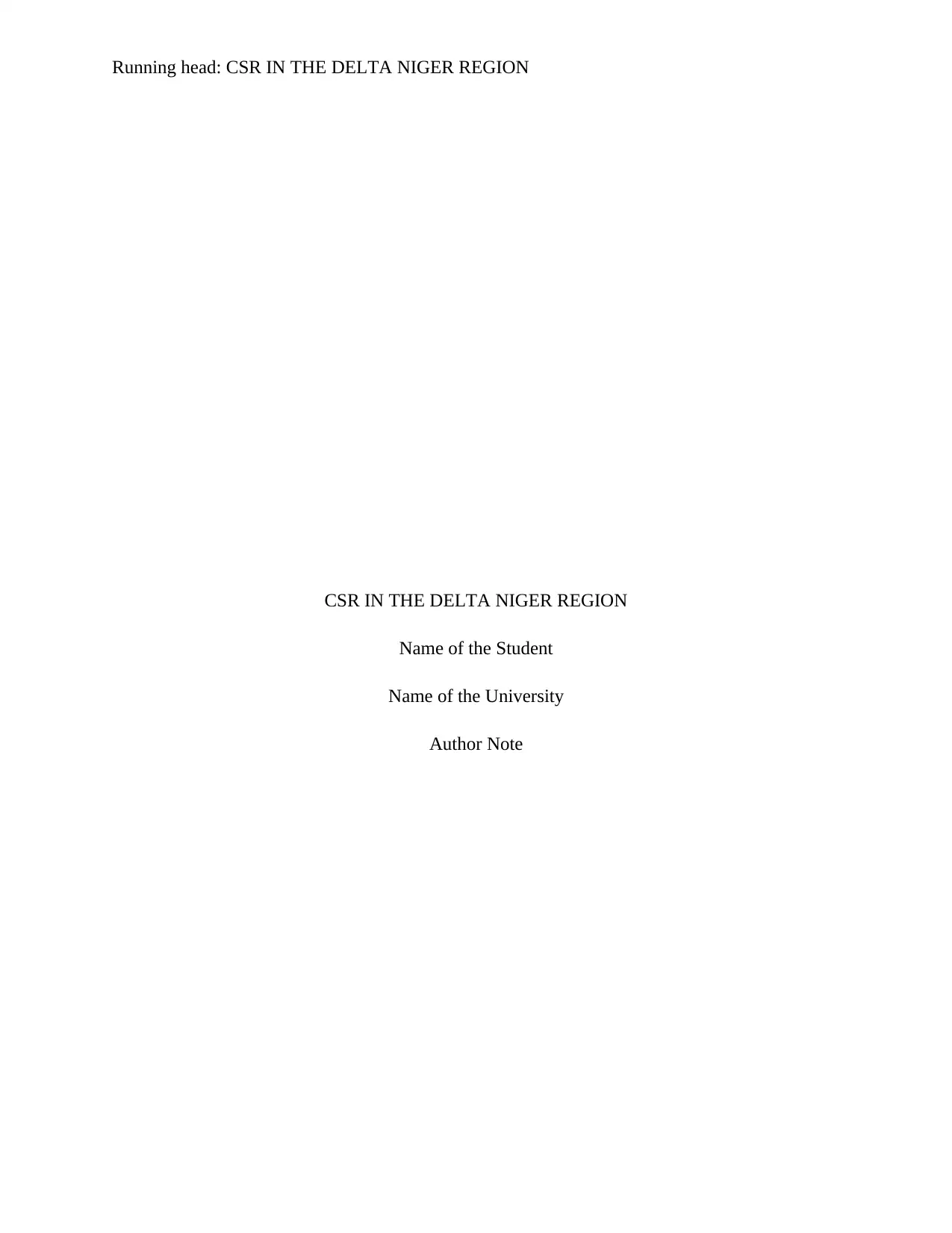
Running head: CSR IN THE DELTA NIGER REGION
CSR IN THE DELTA NIGER REGION
Name of the Student
Name of the University
Author Note
CSR IN THE DELTA NIGER REGION
Name of the Student
Name of the University
Author Note
Paraphrase This Document
Need a fresh take? Get an instant paraphrase of this document with our AI Paraphraser
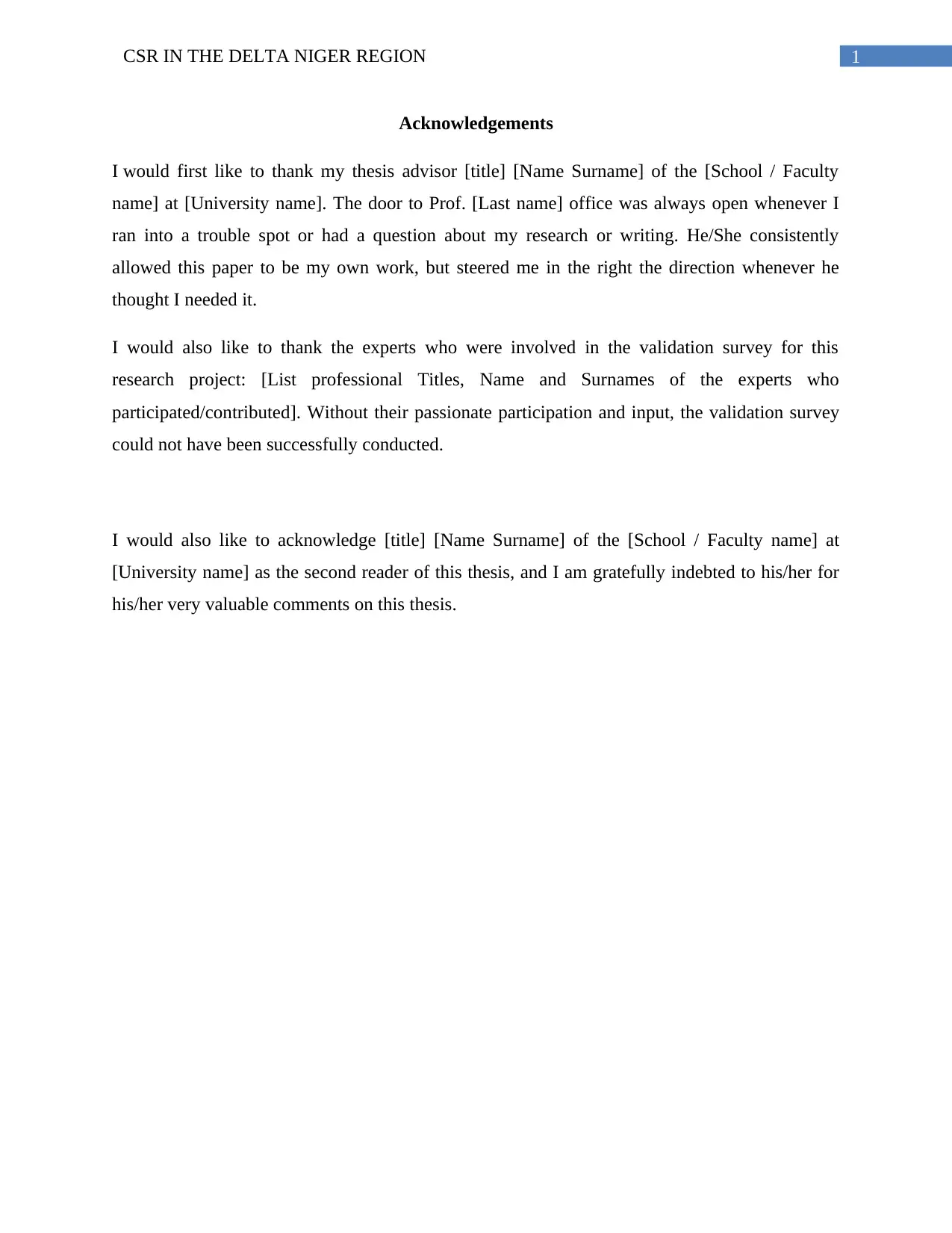
1CSR IN THE DELTA NIGER REGION
Acknowledgements
I would first like to thank my thesis advisor [title] [Name Surname] of the [School / Faculty
name] at [University name]. The door to Prof. [Last name] office was always open whenever I
ran into a trouble spot or had a question about my research or writing. He/She consistently
allowed this paper to be my own work, but steered me in the right the direction whenever he
thought I needed it.
I would also like to thank the experts who were involved in the validation survey for this
research project: [List professional Titles, Name and Surnames of the experts who
participated/contributed]. Without their passionate participation and input, the validation survey
could not have been successfully conducted.
I would also like to acknowledge [title] [Name Surname] of the [School / Faculty name] at
[University name] as the second reader of this thesis, and I am gratefully indebted to his/her for
his/her very valuable comments on this thesis.
Acknowledgements
I would first like to thank my thesis advisor [title] [Name Surname] of the [School / Faculty
name] at [University name]. The door to Prof. [Last name] office was always open whenever I
ran into a trouble spot or had a question about my research or writing. He/She consistently
allowed this paper to be my own work, but steered me in the right the direction whenever he
thought I needed it.
I would also like to thank the experts who were involved in the validation survey for this
research project: [List professional Titles, Name and Surnames of the experts who
participated/contributed]. Without their passionate participation and input, the validation survey
could not have been successfully conducted.
I would also like to acknowledge [title] [Name Surname] of the [School / Faculty name] at
[University name] as the second reader of this thesis, and I am gratefully indebted to his/her for
his/her very valuable comments on this thesis.
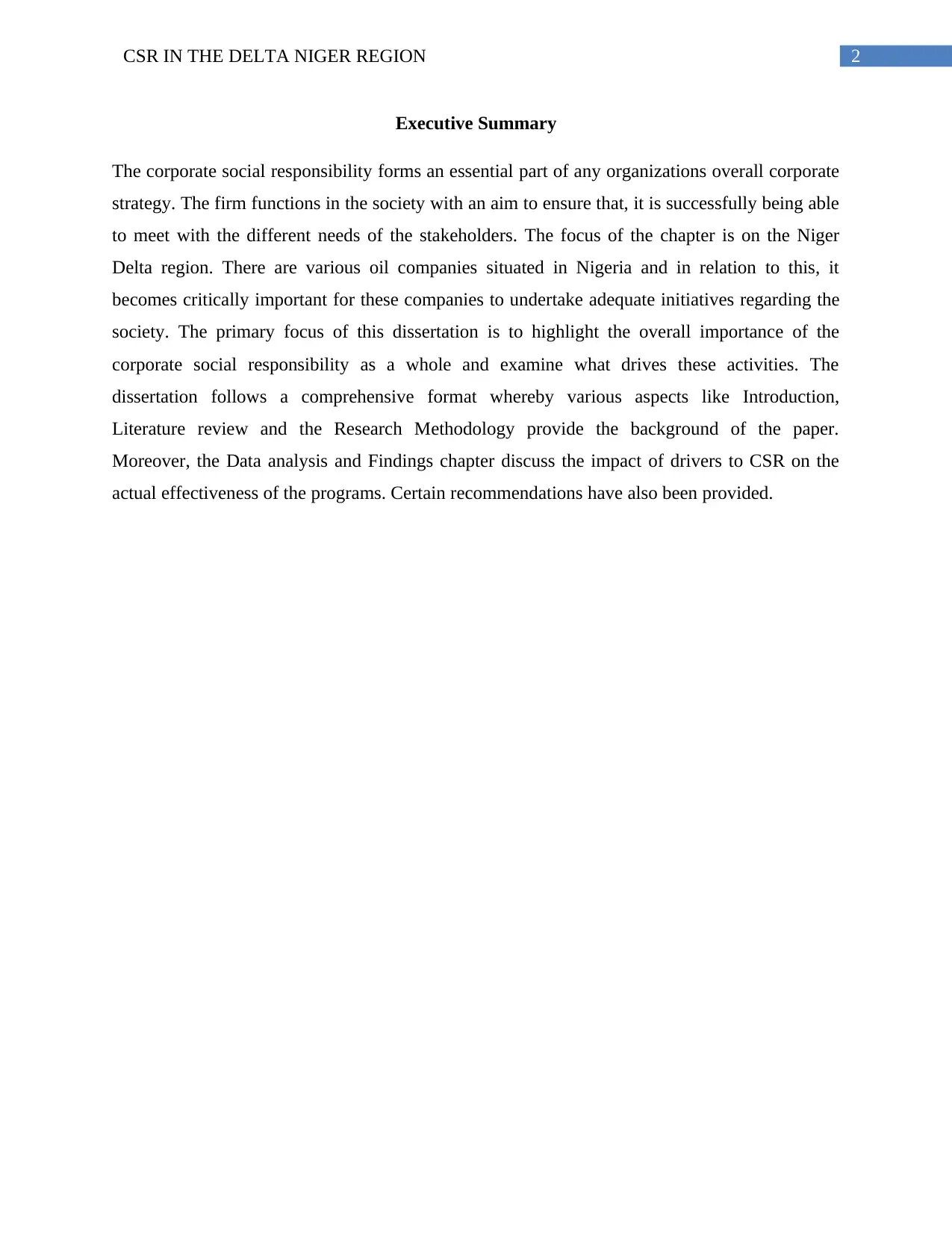
2CSR IN THE DELTA NIGER REGION
Executive Summary
The corporate social responsibility forms an essential part of any organizations overall corporate
strategy. The firm functions in the society with an aim to ensure that, it is successfully being able
to meet with the different needs of the stakeholders. The focus of the chapter is on the Niger
Delta region. There are various oil companies situated in Nigeria and in relation to this, it
becomes critically important for these companies to undertake adequate initiatives regarding the
society. The primary focus of this dissertation is to highlight the overall importance of the
corporate social responsibility as a whole and examine what drives these activities. The
dissertation follows a comprehensive format whereby various aspects like Introduction,
Literature review and the Research Methodology provide the background of the paper.
Moreover, the Data analysis and Findings chapter discuss the impact of drivers to CSR on the
actual effectiveness of the programs. Certain recommendations have also been provided.
Executive Summary
The corporate social responsibility forms an essential part of any organizations overall corporate
strategy. The firm functions in the society with an aim to ensure that, it is successfully being able
to meet with the different needs of the stakeholders. The focus of the chapter is on the Niger
Delta region. There are various oil companies situated in Nigeria and in relation to this, it
becomes critically important for these companies to undertake adequate initiatives regarding the
society. The primary focus of this dissertation is to highlight the overall importance of the
corporate social responsibility as a whole and examine what drives these activities. The
dissertation follows a comprehensive format whereby various aspects like Introduction,
Literature review and the Research Methodology provide the background of the paper.
Moreover, the Data analysis and Findings chapter discuss the impact of drivers to CSR on the
actual effectiveness of the programs. Certain recommendations have also been provided.
⊘ This is a preview!⊘
Do you want full access?
Subscribe today to unlock all pages.

Trusted by 1+ million students worldwide
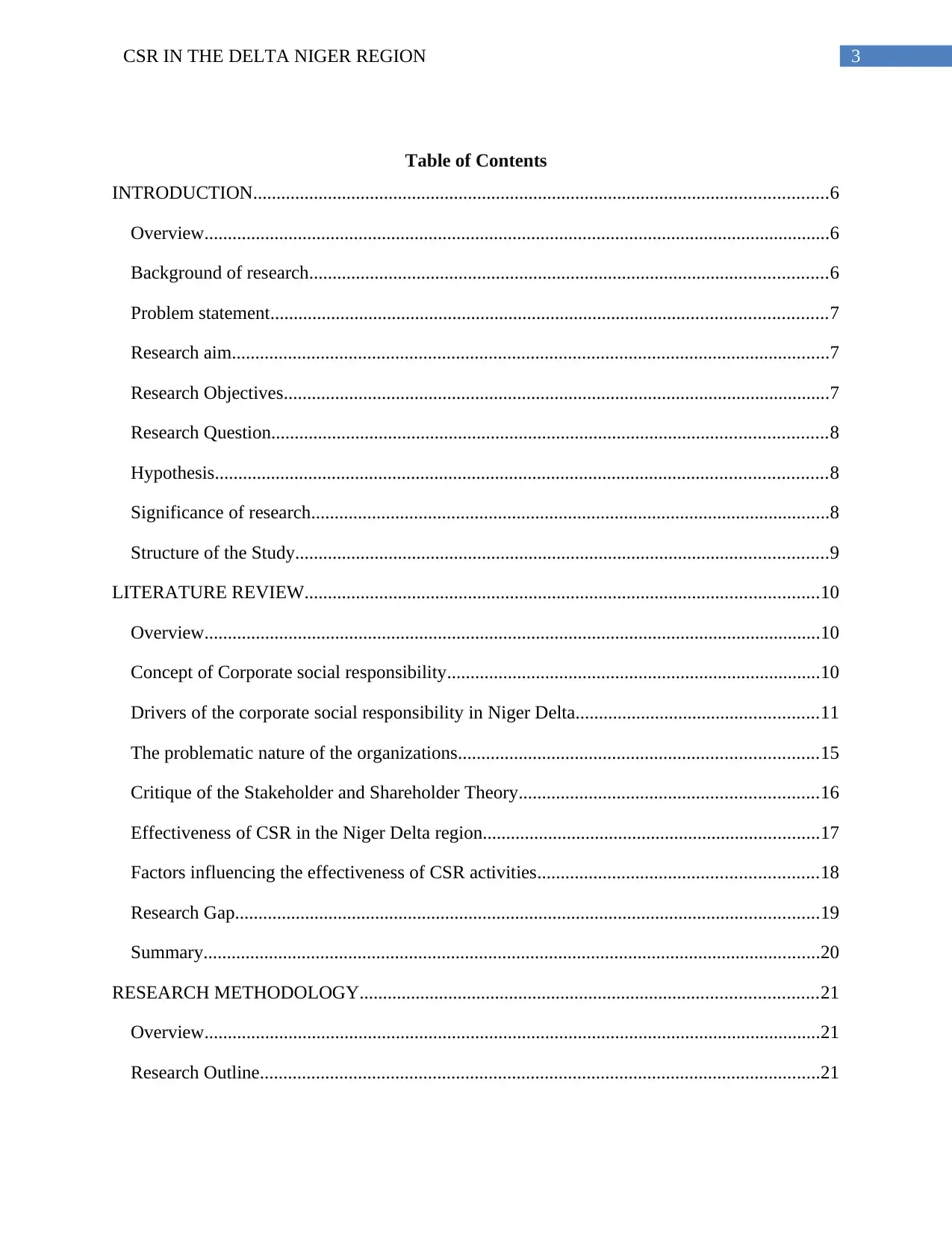
3CSR IN THE DELTA NIGER REGION
Table of Contents
INTRODUCTION...........................................................................................................................6
Overview......................................................................................................................................6
Background of research...............................................................................................................6
Problem statement.......................................................................................................................7
Research aim................................................................................................................................7
Research Objectives.....................................................................................................................7
Research Question.......................................................................................................................8
Hypothesis...................................................................................................................................8
Significance of research...............................................................................................................8
Structure of the Study..................................................................................................................9
LITERATURE REVIEW..............................................................................................................10
Overview....................................................................................................................................10
Concept of Corporate social responsibility................................................................................10
Drivers of the corporate social responsibility in Niger Delta....................................................11
The problematic nature of the organizations.............................................................................15
Critique of the Stakeholder and Shareholder Theory................................................................16
Effectiveness of CSR in the Niger Delta region........................................................................17
Factors influencing the effectiveness of CSR activities............................................................18
Research Gap.............................................................................................................................19
Summary....................................................................................................................................20
RESEARCH METHODOLOGY..................................................................................................21
Overview....................................................................................................................................21
Research Outline........................................................................................................................21
Table of Contents
INTRODUCTION...........................................................................................................................6
Overview......................................................................................................................................6
Background of research...............................................................................................................6
Problem statement.......................................................................................................................7
Research aim................................................................................................................................7
Research Objectives.....................................................................................................................7
Research Question.......................................................................................................................8
Hypothesis...................................................................................................................................8
Significance of research...............................................................................................................8
Structure of the Study..................................................................................................................9
LITERATURE REVIEW..............................................................................................................10
Overview....................................................................................................................................10
Concept of Corporate social responsibility................................................................................10
Drivers of the corporate social responsibility in Niger Delta....................................................11
The problematic nature of the organizations.............................................................................15
Critique of the Stakeholder and Shareholder Theory................................................................16
Effectiveness of CSR in the Niger Delta region........................................................................17
Factors influencing the effectiveness of CSR activities............................................................18
Research Gap.............................................................................................................................19
Summary....................................................................................................................................20
RESEARCH METHODOLOGY..................................................................................................21
Overview....................................................................................................................................21
Research Outline........................................................................................................................21
Paraphrase This Document
Need a fresh take? Get an instant paraphrase of this document with our AI Paraphraser
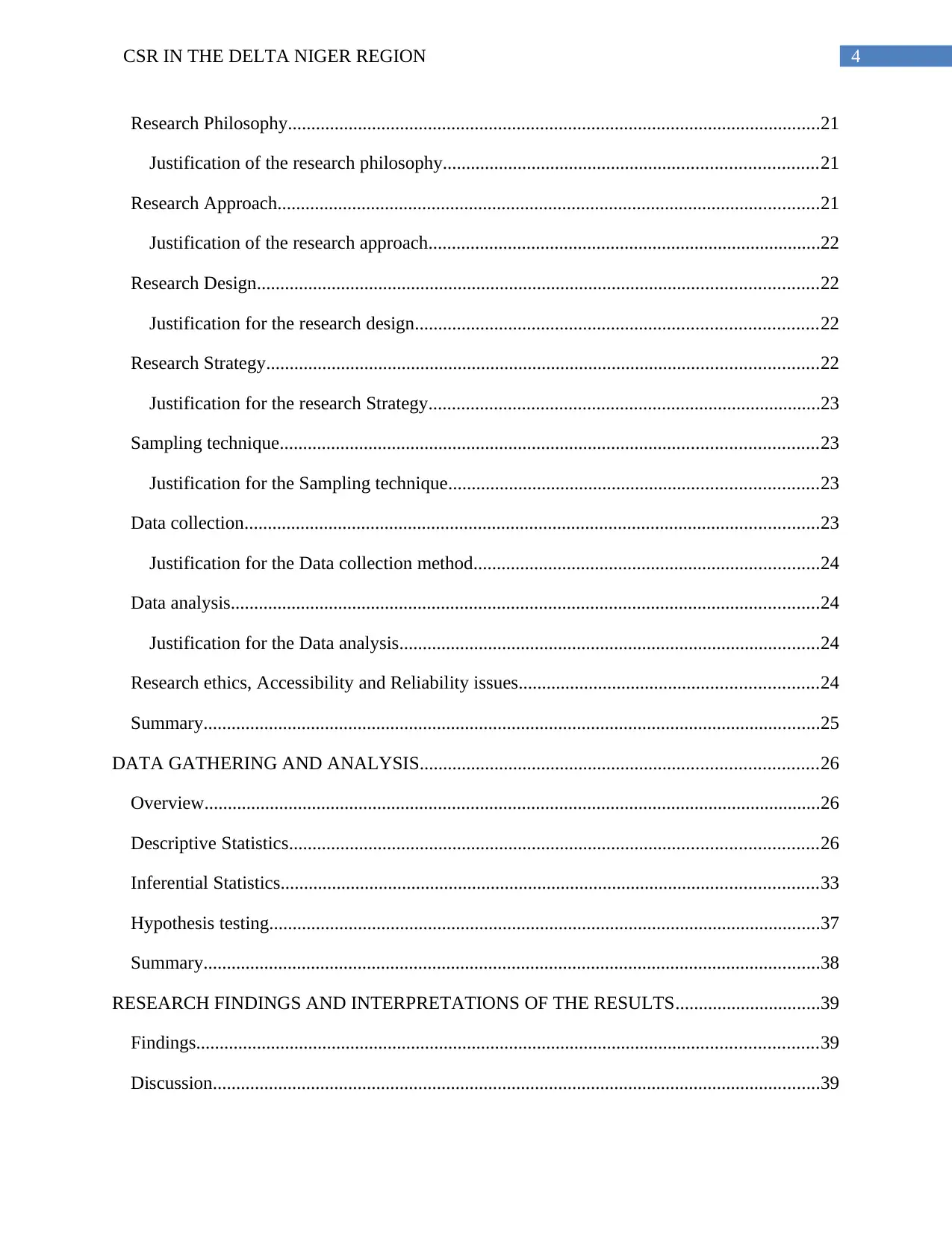
4CSR IN THE DELTA NIGER REGION
Research Philosophy..................................................................................................................21
Justification of the research philosophy................................................................................21
Research Approach....................................................................................................................21
Justification of the research approach....................................................................................22
Research Design........................................................................................................................22
Justification for the research design......................................................................................22
Research Strategy......................................................................................................................22
Justification for the research Strategy....................................................................................23
Sampling technique...................................................................................................................23
Justification for the Sampling technique...............................................................................23
Data collection...........................................................................................................................23
Justification for the Data collection method..........................................................................24
Data analysis..............................................................................................................................24
Justification for the Data analysis..........................................................................................24
Research ethics, Accessibility and Reliability issues................................................................24
Summary....................................................................................................................................25
DATA GATHERING AND ANALYSIS.....................................................................................26
Overview....................................................................................................................................26
Descriptive Statistics.................................................................................................................26
Inferential Statistics...................................................................................................................33
Hypothesis testing......................................................................................................................37
Summary....................................................................................................................................38
RESEARCH FINDINGS AND INTERPRETATIONS OF THE RESULTS...............................39
Findings.....................................................................................................................................39
Discussion..................................................................................................................................39
Research Philosophy..................................................................................................................21
Justification of the research philosophy................................................................................21
Research Approach....................................................................................................................21
Justification of the research approach....................................................................................22
Research Design........................................................................................................................22
Justification for the research design......................................................................................22
Research Strategy......................................................................................................................22
Justification for the research Strategy....................................................................................23
Sampling technique...................................................................................................................23
Justification for the Sampling technique...............................................................................23
Data collection...........................................................................................................................23
Justification for the Data collection method..........................................................................24
Data analysis..............................................................................................................................24
Justification for the Data analysis..........................................................................................24
Research ethics, Accessibility and Reliability issues................................................................24
Summary....................................................................................................................................25
DATA GATHERING AND ANALYSIS.....................................................................................26
Overview....................................................................................................................................26
Descriptive Statistics.................................................................................................................26
Inferential Statistics...................................................................................................................33
Hypothesis testing......................................................................................................................37
Summary....................................................................................................................................38
RESEARCH FINDINGS AND INTERPRETATIONS OF THE RESULTS...............................39
Findings.....................................................................................................................................39
Discussion..................................................................................................................................39
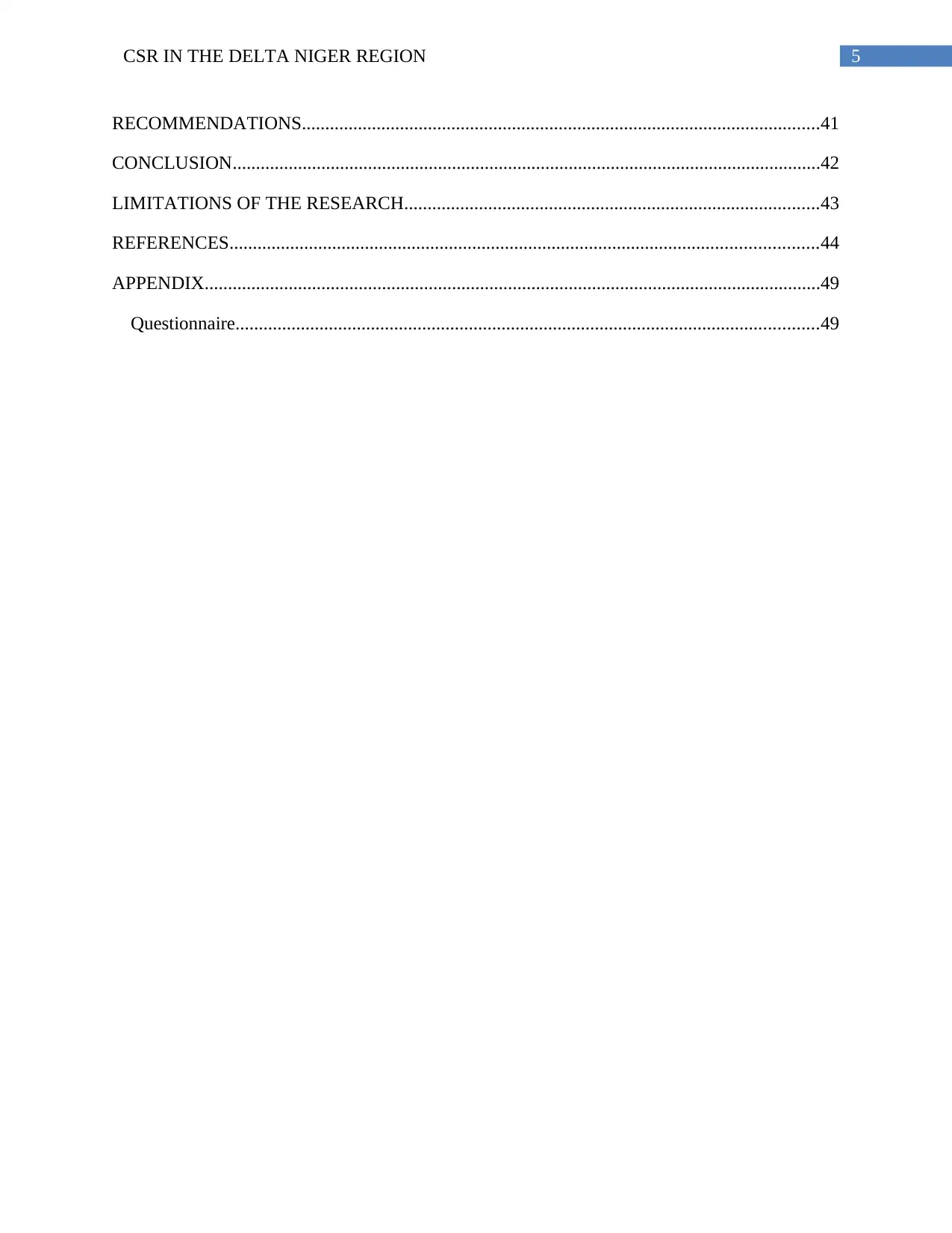
5CSR IN THE DELTA NIGER REGION
RECOMMENDATIONS...............................................................................................................41
CONCLUSION..............................................................................................................................42
LIMITATIONS OF THE RESEARCH.........................................................................................43
REFERENCES..............................................................................................................................44
APPENDIX....................................................................................................................................49
Questionnaire.............................................................................................................................49
RECOMMENDATIONS...............................................................................................................41
CONCLUSION..............................................................................................................................42
LIMITATIONS OF THE RESEARCH.........................................................................................43
REFERENCES..............................................................................................................................44
APPENDIX....................................................................................................................................49
Questionnaire.............................................................................................................................49
⊘ This is a preview!⊘
Do you want full access?
Subscribe today to unlock all pages.

Trusted by 1+ million students worldwide
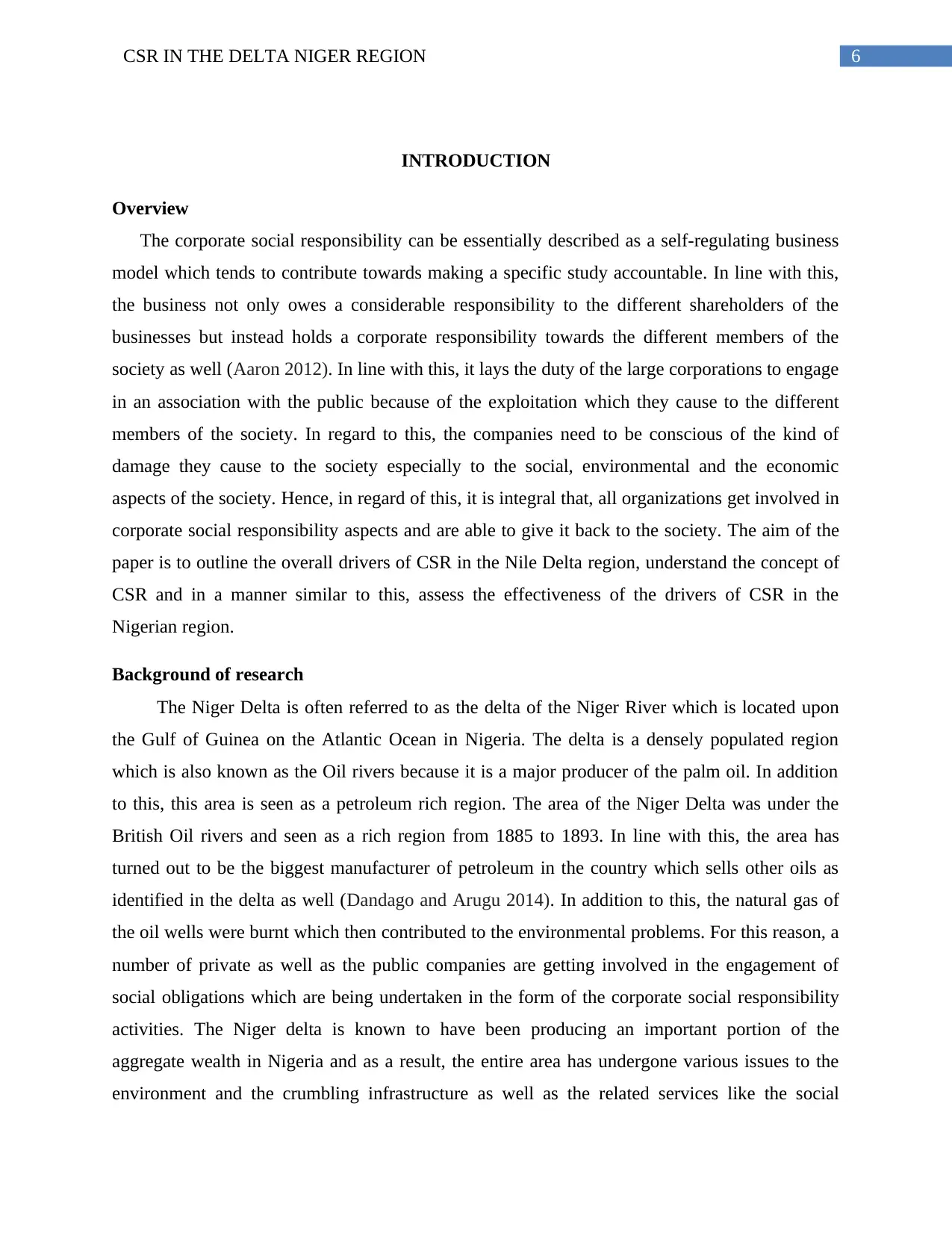
6CSR IN THE DELTA NIGER REGION
INTRODUCTION
Overview
The corporate social responsibility can be essentially described as a self-regulating business
model which tends to contribute towards making a specific study accountable. In line with this,
the business not only owes a considerable responsibility to the different shareholders of the
businesses but instead holds a corporate responsibility towards the different members of the
society as well (Aaron 2012). In line with this, it lays the duty of the large corporations to engage
in an association with the public because of the exploitation which they cause to the different
members of the society. In regard to this, the companies need to be conscious of the kind of
damage they cause to the society especially to the social, environmental and the economic
aspects of the society. Hence, in regard of this, it is integral that, all organizations get involved in
corporate social responsibility aspects and are able to give it back to the society. The aim of the
paper is to outline the overall drivers of CSR in the Nile Delta region, understand the concept of
CSR and in a manner similar to this, assess the effectiveness of the drivers of CSR in the
Nigerian region.
Background of research
The Niger Delta is often referred to as the delta of the Niger River which is located upon
the Gulf of Guinea on the Atlantic Ocean in Nigeria. The delta is a densely populated region
which is also known as the Oil rivers because it is a major producer of the palm oil. In addition
to this, this area is seen as a petroleum rich region. The area of the Niger Delta was under the
British Oil rivers and seen as a rich region from 1885 to 1893. In line with this, the area has
turned out to be the biggest manufacturer of petroleum in the country which sells other oils as
identified in the delta as well (Dandago and Arugu 2014). In addition to this, the natural gas of
the oil wells were burnt which then contributed to the environmental problems. For this reason, a
number of private as well as the public companies are getting involved in the engagement of
social obligations which are being undertaken in the form of the corporate social responsibility
activities. The Niger delta is known to have been producing an important portion of the
aggregate wealth in Nigeria and as a result, the entire area has undergone various issues to the
environment and the crumbling infrastructure as well as the related services like the social
INTRODUCTION
Overview
The corporate social responsibility can be essentially described as a self-regulating business
model which tends to contribute towards making a specific study accountable. In line with this,
the business not only owes a considerable responsibility to the different shareholders of the
businesses but instead holds a corporate responsibility towards the different members of the
society as well (Aaron 2012). In line with this, it lays the duty of the large corporations to engage
in an association with the public because of the exploitation which they cause to the different
members of the society. In regard to this, the companies need to be conscious of the kind of
damage they cause to the society especially to the social, environmental and the economic
aspects of the society. Hence, in regard of this, it is integral that, all organizations get involved in
corporate social responsibility aspects and are able to give it back to the society. The aim of the
paper is to outline the overall drivers of CSR in the Nile Delta region, understand the concept of
CSR and in a manner similar to this, assess the effectiveness of the drivers of CSR in the
Nigerian region.
Background of research
The Niger Delta is often referred to as the delta of the Niger River which is located upon
the Gulf of Guinea on the Atlantic Ocean in Nigeria. The delta is a densely populated region
which is also known as the Oil rivers because it is a major producer of the palm oil. In addition
to this, this area is seen as a petroleum rich region. The area of the Niger Delta was under the
British Oil rivers and seen as a rich region from 1885 to 1893. In line with this, the area has
turned out to be the biggest manufacturer of petroleum in the country which sells other oils as
identified in the delta as well (Dandago and Arugu 2014). In addition to this, the natural gas of
the oil wells were burnt which then contributed to the environmental problems. For this reason, a
number of private as well as the public companies are getting involved in the engagement of
social obligations which are being undertaken in the form of the corporate social responsibility
activities. The Niger delta is known to have been producing an important portion of the
aggregate wealth in Nigeria and as a result, the entire area has undergone various issues to the
environment and the crumbling infrastructure as well as the related services like the social
Paraphrase This Document
Need a fresh take? Get an instant paraphrase of this document with our AI Paraphraser
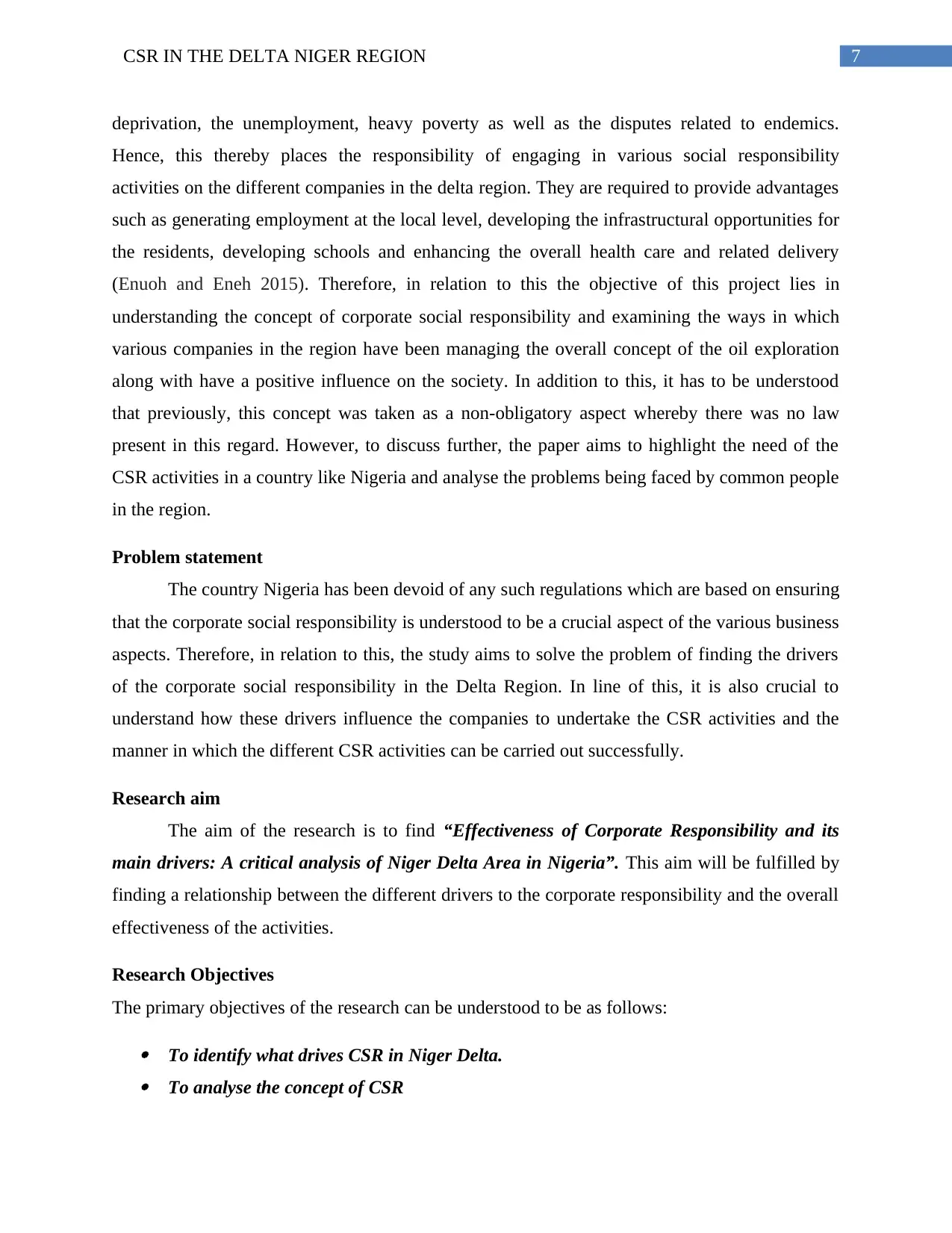
7CSR IN THE DELTA NIGER REGION
deprivation, the unemployment, heavy poverty as well as the disputes related to endemics.
Hence, this thereby places the responsibility of engaging in various social responsibility
activities on the different companies in the delta region. They are required to provide advantages
such as generating employment at the local level, developing the infrastructural opportunities for
the residents, developing schools and enhancing the overall health care and related delivery
(Enuoh and Eneh 2015). Therefore, in relation to this the objective of this project lies in
understanding the concept of corporate social responsibility and examining the ways in which
various companies in the region have been managing the overall concept of the oil exploration
along with have a positive influence on the society. In addition to this, it has to be understood
that previously, this concept was taken as a non-obligatory aspect whereby there was no law
present in this regard. However, to discuss further, the paper aims to highlight the need of the
CSR activities in a country like Nigeria and analyse the problems being faced by common people
in the region.
Problem statement
The country Nigeria has been devoid of any such regulations which are based on ensuring
that the corporate social responsibility is understood to be a crucial aspect of the various business
aspects. Therefore, in relation to this, the study aims to solve the problem of finding the drivers
of the corporate social responsibility in the Delta Region. In line of this, it is also crucial to
understand how these drivers influence the companies to undertake the CSR activities and the
manner in which the different CSR activities can be carried out successfully.
Research aim
The aim of the research is to find “Effectiveness of Corporate Responsibility and its
main drivers: A critical analysis of Niger Delta Area in Nigeria”. This aim will be fulfilled by
finding a relationship between the different drivers to the corporate responsibility and the overall
effectiveness of the activities.
Research Objectives
The primary objectives of the research can be understood to be as follows:
To identify what drives CSR in Niger Delta. To analyse the concept of CSR
deprivation, the unemployment, heavy poverty as well as the disputes related to endemics.
Hence, this thereby places the responsibility of engaging in various social responsibility
activities on the different companies in the delta region. They are required to provide advantages
such as generating employment at the local level, developing the infrastructural opportunities for
the residents, developing schools and enhancing the overall health care and related delivery
(Enuoh and Eneh 2015). Therefore, in relation to this the objective of this project lies in
understanding the concept of corporate social responsibility and examining the ways in which
various companies in the region have been managing the overall concept of the oil exploration
along with have a positive influence on the society. In addition to this, it has to be understood
that previously, this concept was taken as a non-obligatory aspect whereby there was no law
present in this regard. However, to discuss further, the paper aims to highlight the need of the
CSR activities in a country like Nigeria and analyse the problems being faced by common people
in the region.
Problem statement
The country Nigeria has been devoid of any such regulations which are based on ensuring
that the corporate social responsibility is understood to be a crucial aspect of the various business
aspects. Therefore, in relation to this, the study aims to solve the problem of finding the drivers
of the corporate social responsibility in the Delta Region. In line of this, it is also crucial to
understand how these drivers influence the companies to undertake the CSR activities and the
manner in which the different CSR activities can be carried out successfully.
Research aim
The aim of the research is to find “Effectiveness of Corporate Responsibility and its
main drivers: A critical analysis of Niger Delta Area in Nigeria”. This aim will be fulfilled by
finding a relationship between the different drivers to the corporate responsibility and the overall
effectiveness of the activities.
Research Objectives
The primary objectives of the research can be understood to be as follows:
To identify what drives CSR in Niger Delta. To analyse the concept of CSR
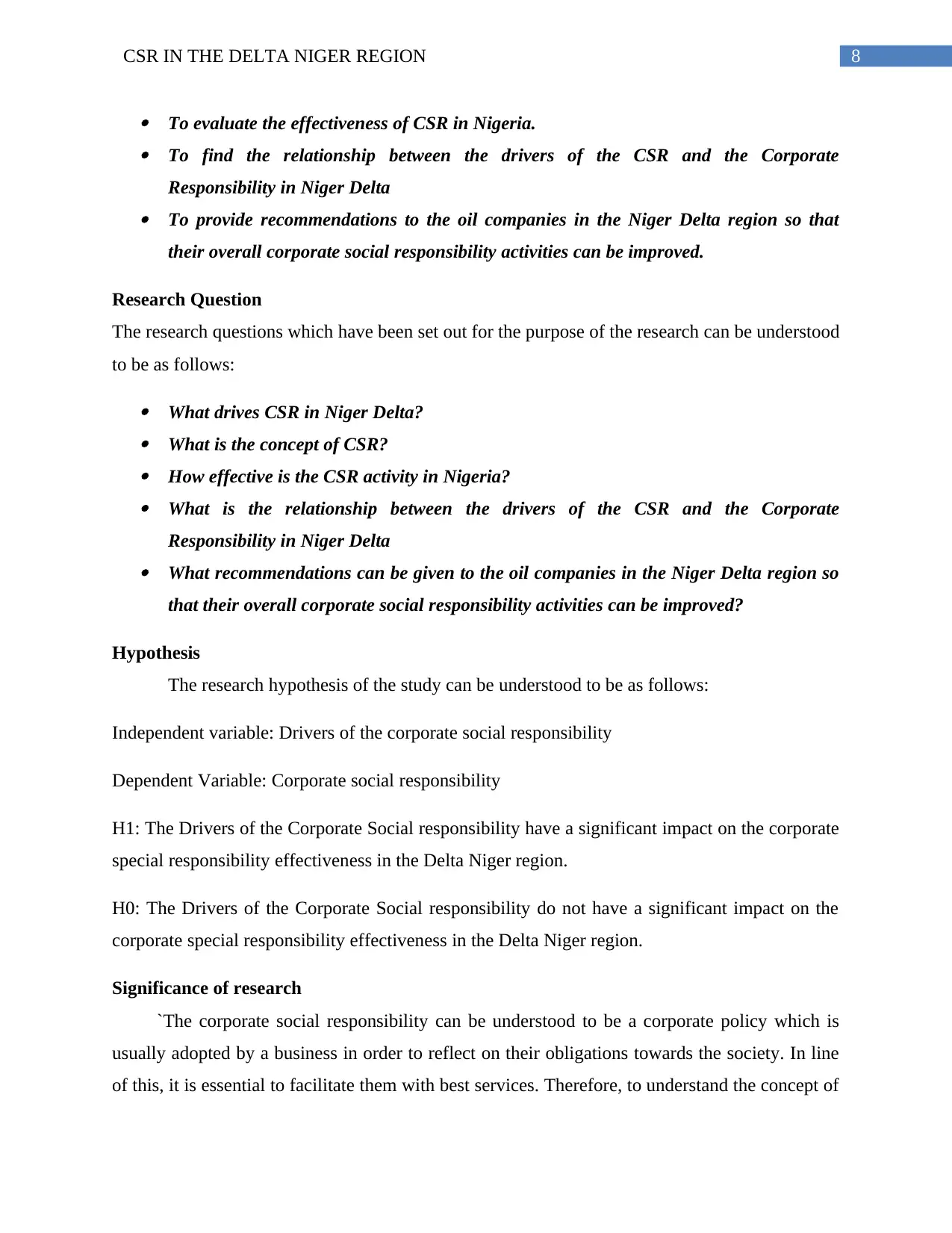
8CSR IN THE DELTA NIGER REGION
To evaluate the effectiveness of CSR in Nigeria. To find the relationship between the drivers of the CSR and the Corporate
Responsibility in Niger Delta To provide recommendations to the oil companies in the Niger Delta region so that
their overall corporate social responsibility activities can be improved.
Research Question
The research questions which have been set out for the purpose of the research can be understood
to be as follows:
What drives CSR in Niger Delta? What is the concept of CSR? How effective is the CSR activity in Nigeria? What is the relationship between the drivers of the CSR and the Corporate
Responsibility in Niger Delta What recommendations can be given to the oil companies in the Niger Delta region so
that their overall corporate social responsibility activities can be improved?
Hypothesis
The research hypothesis of the study can be understood to be as follows:
Independent variable: Drivers of the corporate social responsibility
Dependent Variable: Corporate social responsibility
H1: The Drivers of the Corporate Social responsibility have a significant impact on the corporate
special responsibility effectiveness in the Delta Niger region.
H0: The Drivers of the Corporate Social responsibility do not have a significant impact on the
corporate special responsibility effectiveness in the Delta Niger region.
Significance of research
`The corporate social responsibility can be understood to be a corporate policy which is
usually adopted by a business in order to reflect on their obligations towards the society. In line
of this, it is essential to facilitate them with best services. Therefore, to understand the concept of
To evaluate the effectiveness of CSR in Nigeria. To find the relationship between the drivers of the CSR and the Corporate
Responsibility in Niger Delta To provide recommendations to the oil companies in the Niger Delta region so that
their overall corporate social responsibility activities can be improved.
Research Question
The research questions which have been set out for the purpose of the research can be understood
to be as follows:
What drives CSR in Niger Delta? What is the concept of CSR? How effective is the CSR activity in Nigeria? What is the relationship between the drivers of the CSR and the Corporate
Responsibility in Niger Delta What recommendations can be given to the oil companies in the Niger Delta region so
that their overall corporate social responsibility activities can be improved?
Hypothesis
The research hypothesis of the study can be understood to be as follows:
Independent variable: Drivers of the corporate social responsibility
Dependent Variable: Corporate social responsibility
H1: The Drivers of the Corporate Social responsibility have a significant impact on the corporate
special responsibility effectiveness in the Delta Niger region.
H0: The Drivers of the Corporate Social responsibility do not have a significant impact on the
corporate special responsibility effectiveness in the Delta Niger region.
Significance of research
`The corporate social responsibility can be understood to be a corporate policy which is
usually adopted by a business in order to reflect on their obligations towards the society. In line
of this, it is essential to facilitate them with best services. Therefore, to understand the concept of
⊘ This is a preview!⊘
Do you want full access?
Subscribe today to unlock all pages.

Trusted by 1+ million students worldwide
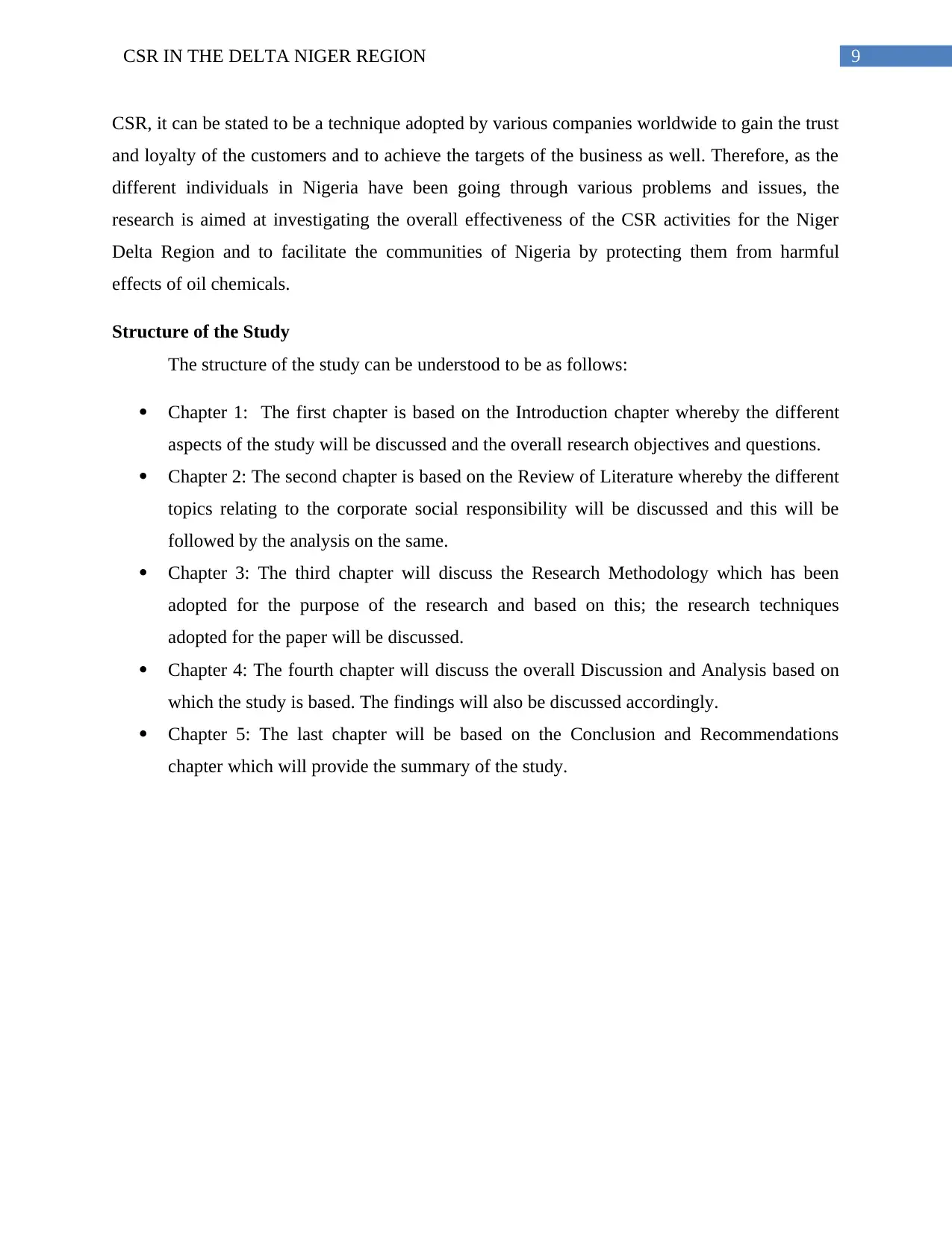
9CSR IN THE DELTA NIGER REGION
CSR, it can be stated to be a technique adopted by various companies worldwide to gain the trust
and loyalty of the customers and to achieve the targets of the business as well. Therefore, as the
different individuals in Nigeria have been going through various problems and issues, the
research is aimed at investigating the overall effectiveness of the CSR activities for the Niger
Delta Region and to facilitate the communities of Nigeria by protecting them from harmful
effects of oil chemicals.
Structure of the Study
The structure of the study can be understood to be as follows:
Chapter 1: The first chapter is based on the Introduction chapter whereby the different
aspects of the study will be discussed and the overall research objectives and questions.
Chapter 2: The second chapter is based on the Review of Literature whereby the different
topics relating to the corporate social responsibility will be discussed and this will be
followed by the analysis on the same.
Chapter 3: The third chapter will discuss the Research Methodology which has been
adopted for the purpose of the research and based on this; the research techniques
adopted for the paper will be discussed.
Chapter 4: The fourth chapter will discuss the overall Discussion and Analysis based on
which the study is based. The findings will also be discussed accordingly.
Chapter 5: The last chapter will be based on the Conclusion and Recommendations
chapter which will provide the summary of the study.
CSR, it can be stated to be a technique adopted by various companies worldwide to gain the trust
and loyalty of the customers and to achieve the targets of the business as well. Therefore, as the
different individuals in Nigeria have been going through various problems and issues, the
research is aimed at investigating the overall effectiveness of the CSR activities for the Niger
Delta Region and to facilitate the communities of Nigeria by protecting them from harmful
effects of oil chemicals.
Structure of the Study
The structure of the study can be understood to be as follows:
Chapter 1: The first chapter is based on the Introduction chapter whereby the different
aspects of the study will be discussed and the overall research objectives and questions.
Chapter 2: The second chapter is based on the Review of Literature whereby the different
topics relating to the corporate social responsibility will be discussed and this will be
followed by the analysis on the same.
Chapter 3: The third chapter will discuss the Research Methodology which has been
adopted for the purpose of the research and based on this; the research techniques
adopted for the paper will be discussed.
Chapter 4: The fourth chapter will discuss the overall Discussion and Analysis based on
which the study is based. The findings will also be discussed accordingly.
Chapter 5: The last chapter will be based on the Conclusion and Recommendations
chapter which will provide the summary of the study.
Paraphrase This Document
Need a fresh take? Get an instant paraphrase of this document with our AI Paraphraser
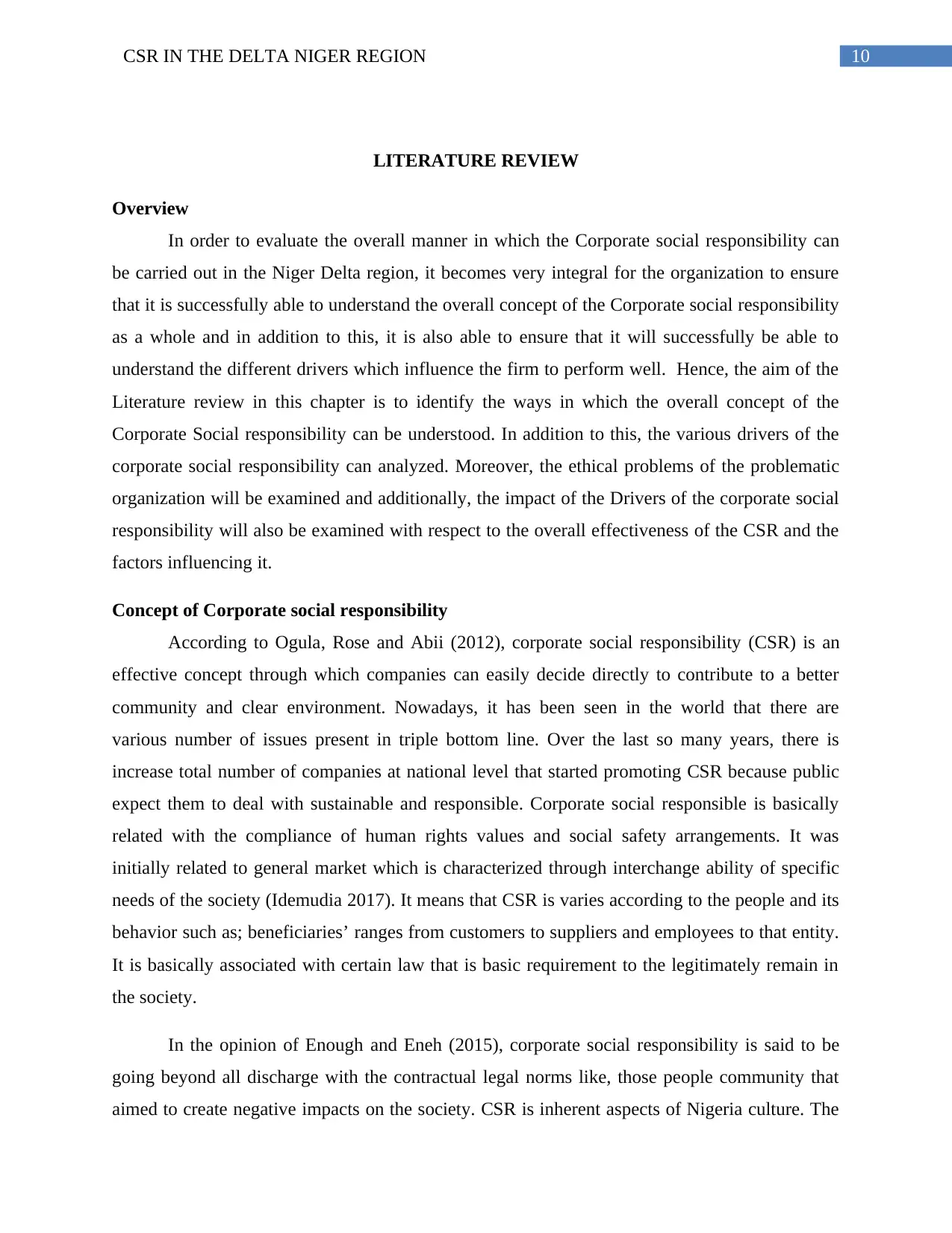
10CSR IN THE DELTA NIGER REGION
LITERATURE REVIEW
Overview
In order to evaluate the overall manner in which the Corporate social responsibility can
be carried out in the Niger Delta region, it becomes very integral for the organization to ensure
that it is successfully able to understand the overall concept of the Corporate social responsibility
as a whole and in addition to this, it is also able to ensure that it will successfully be able to
understand the different drivers which influence the firm to perform well. Hence, the aim of the
Literature review in this chapter is to identify the ways in which the overall concept of the
Corporate Social responsibility can be understood. In addition to this, the various drivers of the
corporate social responsibility can analyzed. Moreover, the ethical problems of the problematic
organization will be examined and additionally, the impact of the Drivers of the corporate social
responsibility will also be examined with respect to the overall effectiveness of the CSR and the
factors influencing it.
Concept of Corporate social responsibility
According to Ogula, Rose and Abii (2012), corporate social responsibility (CSR) is an
effective concept through which companies can easily decide directly to contribute to a better
community and clear environment. Nowadays, it has been seen in the world that there are
various number of issues present in triple bottom line. Over the last so many years, there is
increase total number of companies at national level that started promoting CSR because public
expect them to deal with sustainable and responsible. Corporate social responsible is basically
related with the compliance of human rights values and social safety arrangements. It was
initially related to general market which is characterized through interchange ability of specific
needs of the society (Idemudia 2017). It means that CSR is varies according to the people and its
behavior such as; beneficiaries’ ranges from customers to suppliers and employees to that entity.
It is basically associated with certain law that is basic requirement to the legitimately remain in
the society.
In the opinion of Enough and Eneh (2015), corporate social responsibility is said to be
going beyond all discharge with the contractual legal norms like, those people community that
aimed to create negative impacts on the society. CSR is inherent aspects of Nigeria culture. The
LITERATURE REVIEW
Overview
In order to evaluate the overall manner in which the Corporate social responsibility can
be carried out in the Niger Delta region, it becomes very integral for the organization to ensure
that it is successfully able to understand the overall concept of the Corporate social responsibility
as a whole and in addition to this, it is also able to ensure that it will successfully be able to
understand the different drivers which influence the firm to perform well. Hence, the aim of the
Literature review in this chapter is to identify the ways in which the overall concept of the
Corporate Social responsibility can be understood. In addition to this, the various drivers of the
corporate social responsibility can analyzed. Moreover, the ethical problems of the problematic
organization will be examined and additionally, the impact of the Drivers of the corporate social
responsibility will also be examined with respect to the overall effectiveness of the CSR and the
factors influencing it.
Concept of Corporate social responsibility
According to Ogula, Rose and Abii (2012), corporate social responsibility (CSR) is an
effective concept through which companies can easily decide directly to contribute to a better
community and clear environment. Nowadays, it has been seen in the world that there are
various number of issues present in triple bottom line. Over the last so many years, there is
increase total number of companies at national level that started promoting CSR because public
expect them to deal with sustainable and responsible. Corporate social responsible is basically
related with the compliance of human rights values and social safety arrangements. It was
initially related to general market which is characterized through interchange ability of specific
needs of the society (Idemudia 2017). It means that CSR is varies according to the people and its
behavior such as; beneficiaries’ ranges from customers to suppliers and employees to that entity.
It is basically associated with certain law that is basic requirement to the legitimately remain in
the society.
In the opinion of Enough and Eneh (2015), corporate social responsibility is said to be
going beyond all discharge with the contractual legal norms like, those people community that
aimed to create negative impacts on the society. CSR is inherent aspects of Nigeria culture. The
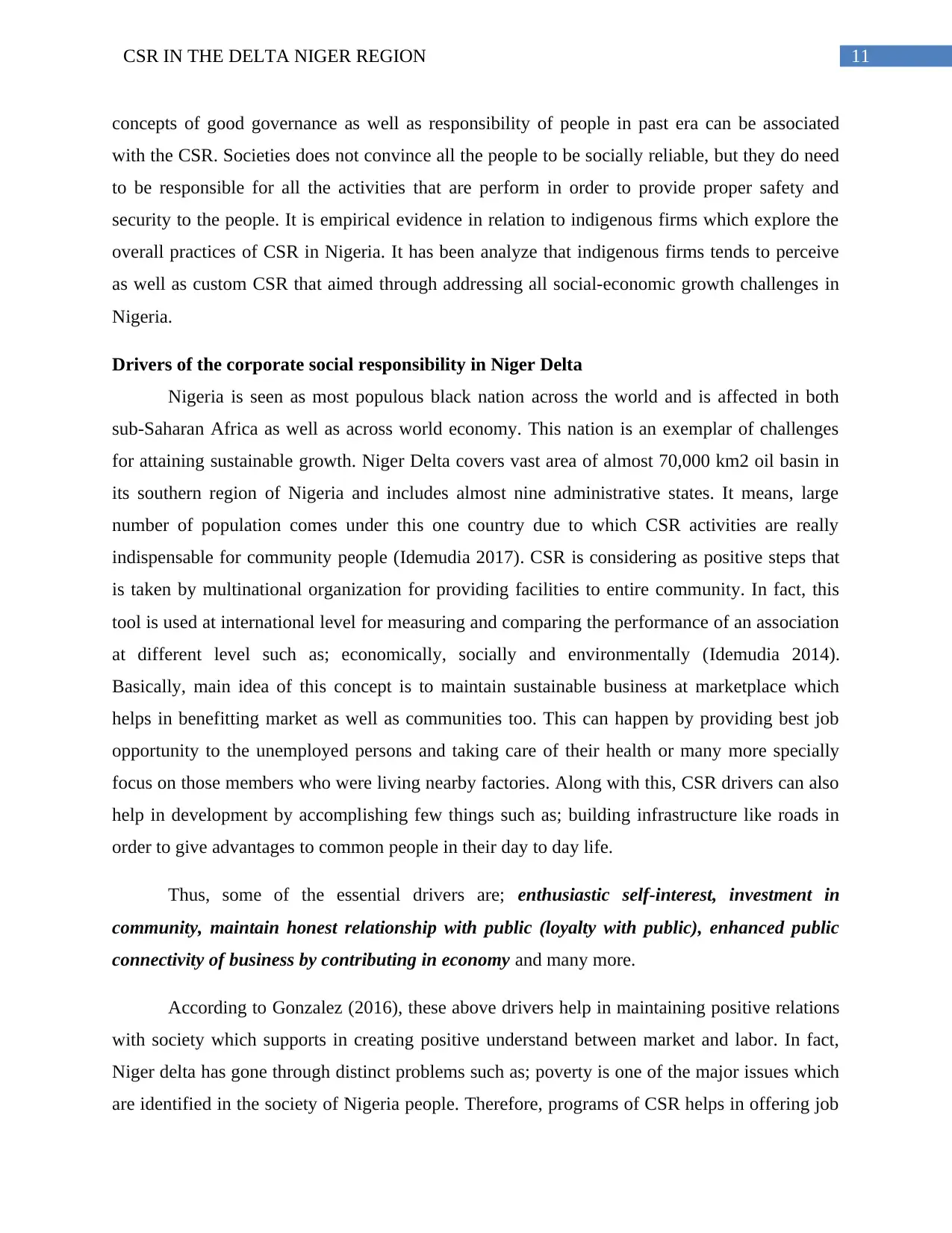
11CSR IN THE DELTA NIGER REGION
concepts of good governance as well as responsibility of people in past era can be associated
with the CSR. Societies does not convince all the people to be socially reliable, but they do need
to be responsible for all the activities that are perform in order to provide proper safety and
security to the people. It is empirical evidence in relation to indigenous firms which explore the
overall practices of CSR in Nigeria. It has been analyze that indigenous firms tends to perceive
as well as custom CSR that aimed through addressing all social-economic growth challenges in
Nigeria.
Drivers of the corporate social responsibility in Niger Delta
Nigeria is seen as most populous black nation across the world and is affected in both
sub-Saharan Africa as well as across world economy. This nation is an exemplar of challenges
for attaining sustainable growth. Niger Delta covers vast area of almost 70,000 km2 oil basin in
its southern region of Nigeria and includes almost nine administrative states. It means, large
number of population comes under this one country due to which CSR activities are really
indispensable for community people (Idemudia 2017). CSR is considering as positive steps that
is taken by multinational organization for providing facilities to entire community. In fact, this
tool is used at international level for measuring and comparing the performance of an association
at different level such as; economically, socially and environmentally (Idemudia 2014).
Basically, main idea of this concept is to maintain sustainable business at marketplace which
helps in benefitting market as well as communities too. This can happen by providing best job
opportunity to the unemployed persons and taking care of their health or many more specially
focus on those members who were living nearby factories. Along with this, CSR drivers can also
help in development by accomplishing few things such as; building infrastructure like roads in
order to give advantages to common people in their day to day life.
Thus, some of the essential drivers are; enthusiastic self-interest, investment in
community, maintain honest relationship with public (loyalty with public), enhanced public
connectivity of business by contributing in economy and many more.
According to Gonzalez (2016), these above drivers help in maintaining positive relations
with society which supports in creating positive understand between market and labor. In fact,
Niger delta has gone through distinct problems such as; poverty is one of the major issues which
are identified in the society of Nigeria people. Therefore, programs of CSR helps in offering job
concepts of good governance as well as responsibility of people in past era can be associated
with the CSR. Societies does not convince all the people to be socially reliable, but they do need
to be responsible for all the activities that are perform in order to provide proper safety and
security to the people. It is empirical evidence in relation to indigenous firms which explore the
overall practices of CSR in Nigeria. It has been analyze that indigenous firms tends to perceive
as well as custom CSR that aimed through addressing all social-economic growth challenges in
Nigeria.
Drivers of the corporate social responsibility in Niger Delta
Nigeria is seen as most populous black nation across the world and is affected in both
sub-Saharan Africa as well as across world economy. This nation is an exemplar of challenges
for attaining sustainable growth. Niger Delta covers vast area of almost 70,000 km2 oil basin in
its southern region of Nigeria and includes almost nine administrative states. It means, large
number of population comes under this one country due to which CSR activities are really
indispensable for community people (Idemudia 2017). CSR is considering as positive steps that
is taken by multinational organization for providing facilities to entire community. In fact, this
tool is used at international level for measuring and comparing the performance of an association
at different level such as; economically, socially and environmentally (Idemudia 2014).
Basically, main idea of this concept is to maintain sustainable business at marketplace which
helps in benefitting market as well as communities too. This can happen by providing best job
opportunity to the unemployed persons and taking care of their health or many more specially
focus on those members who were living nearby factories. Along with this, CSR drivers can also
help in development by accomplishing few things such as; building infrastructure like roads in
order to give advantages to common people in their day to day life.
Thus, some of the essential drivers are; enthusiastic self-interest, investment in
community, maintain honest relationship with public (loyalty with public), enhanced public
connectivity of business by contributing in economy and many more.
According to Gonzalez (2016), these above drivers help in maintaining positive relations
with society which supports in creating positive understand between market and labor. In fact,
Niger delta has gone through distinct problems such as; poverty is one of the major issues which
are identified in the society of Nigeria people. Therefore, programs of CSR helps in offering job
⊘ This is a preview!⊘
Do you want full access?
Subscribe today to unlock all pages.

Trusted by 1+ million students worldwide
1 out of 53
Related Documents
Your All-in-One AI-Powered Toolkit for Academic Success.
+13062052269
info@desklib.com
Available 24*7 on WhatsApp / Email
![[object Object]](/_next/static/media/star-bottom.7253800d.svg)
Unlock your academic potential
Copyright © 2020–2026 A2Z Services. All Rights Reserved. Developed and managed by ZUCOL.





